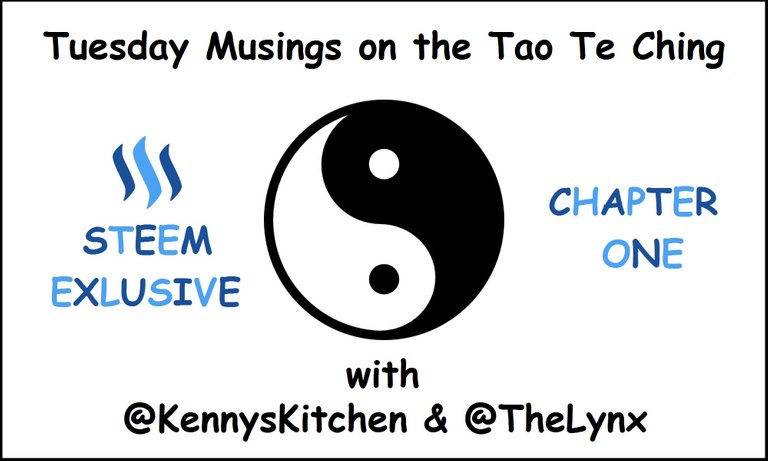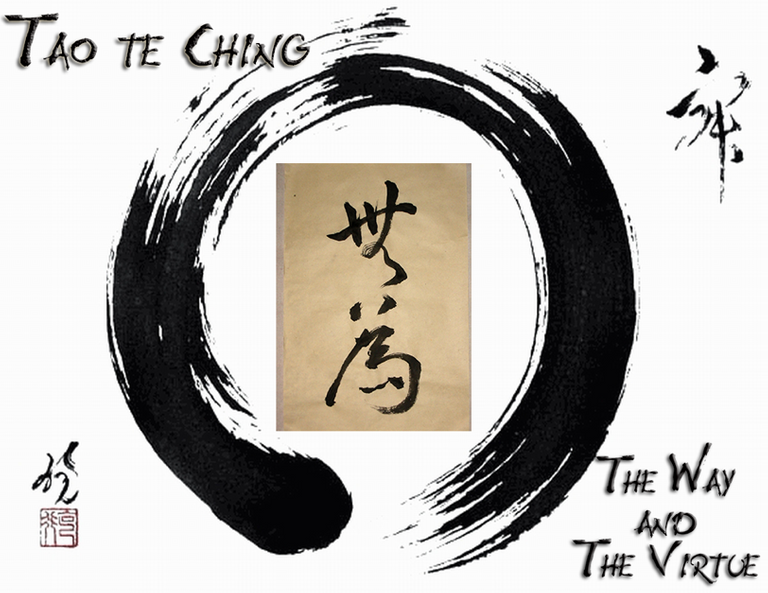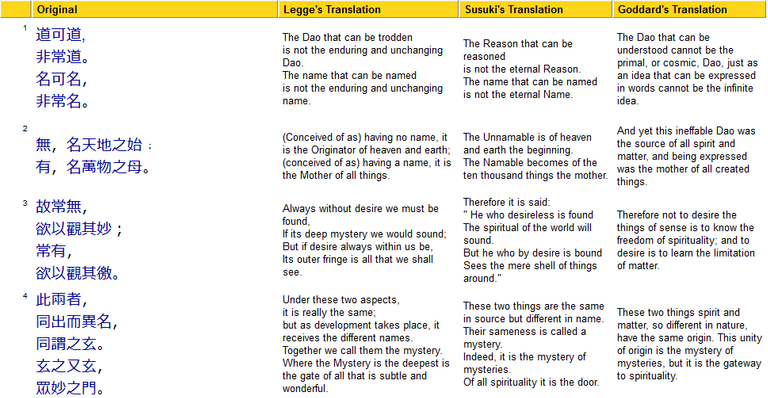
For some time, I've been wanting to do create more periodic, sequential content... and it hasn't really happened yet. I've also been wanting to get more collaborative projects going.
I decided to get started with both desires finally, launching a weekly series where my partner @TheLynx & I will be taking a look at the Tao Te Ching (pronounced "Dao/Dow De/Day Jing"), one chapter at a time.
The Tao Te Ching was written by Laozi/Lao Tzu at least 2400 years ago. Although there are certainly a wide variety of texts and teachers that have come together to form the basis of modern Taoism, the original Tao Te Ching is central. It's been translated hundreds of times, and it is certainly one of the most influential spiritual texts of modern humanity.
To be perfectly clear, neither of us is an "expert" on the Tao, or even consider ourselves Taoist, and we are not trying to come across as any sort of authority figures. Just two humans meditating on the text and sharing what comes up for us, hopefully starting a conversation with you folks!
The most difficult part of setting this up is picking which translation of the Tao Te Ching to use, since obviously it wasn't written in English, and we can't read classical (or any other version) of Chinese. We've finally settled on using just 9 different translations for each chapter. 7 of them (and the original Chinese) will be included as a screenshot (from 2 sites that each offer a variety), while the other two will be included as quotes in the text body of the posts.
- YellowBridge - Original Chinese & 3 translations:
- TranslationComparison - 4 translations:
- DC Lau (1964)
- Ursula K. Le Guin (1997)
After showing @TheLynx the various translations that I wanted to focus on, she had this to say:
I love reading all the different translations. They really have such different tones and meanings, and inspire such different flavors of understanding! And reading them all provides a deeper understanding than any one or two could on their own. At first I wasn't sure I liked Goddard's because it seems to take liberties, rather than being as direct and literal a translation as possible, but now, so far, I think it's one of my favorites, along with D.C. Lau's. I also really like Le Guin's.

Chapter 1
The way that can be spoken of
Is not the constant way;
The name that can be named
Is not the constant name.The nameless was the beginning of heaven and earth;
The named was the mother of the myriad creatures.Hence always rid yourself of desires in order to observe its secrets;
But always allow yourself to have desires in order to observe its manifestations.These two are the same
But diverge in name as they issue forth.
Being the same they are called mysteries,
Mystery upon mystery –
The gateway of the manifold secrets.
The way you can go isn’t the real way.
The name you can say isn’t the real name.Heaven and earth begin in the unnamed:
name’s the mother of the ten thousand things.So the unwanting soul sees what’s hidden,
and the ever-wanting soul sees only what it wants.Two things, one origin,
but different in name,
whose identity is mystery.
Mystery of all mysteries!
The door to the hidden.


Thoughts/Reflections/Insights from @KennysKitchen
The first thing that comes to mind as I sit with this chapter is the fractal nature of reality. Because we humans are living at this particular magnification level, we are pretty limited in our observations and even our abstractions, with anything at a higher or lower magnification (the atomic & smaller or the galactic, universal & larger) being relatively outside of our comprehension or ability to label. If we can name it, if we can describe it, we are only doing so from this viewpoint, and thus our naming cannot encapsulate the whole of the thing.
The next part of this chapter seems to me as an extremely clear statement that focusing our attention on the physical, material world means that our observation/experience will be limited to that realm, and we will not be able to observe the whole, the unseen, the higher order fractals. Certainly this seems to align with the concepts of Buddhism, the teachings of Jesus, and many other spiritual teachings which tell us to focus on the world(s) beyond what we see here.
The final piece of the chapter feels like it's' telling us that although it can be easy to fall into the trap of only seeing the material world and losing out on all the rest, in truth all things are one thing, one creation, one Way. Even if we are fully immersed in & focused on the physical and full of desires & attachments, our very being and everything we do is part of the broader perfection that makes up all of the Universe.
Thoughts/Reflections/Insights from @TheLynx
First and foremost, I like that this first chapter presents the paradoxical nature of the Tao, which for me is a sign that there is probably truth here, since I think many, if not most (maybe all?) truths are paradoxes. Whenever I hear a claim that something both is and isn't something, my ears perk up.
The words "constant", "eternal", "enduring", and "unchanging" all point to the truth of impermanence, another foundational concept. This seems to be saying that if you've found some insight that seems to be always true and enduring, you can be fairly sure you haven't found an actual truth. I like the term "infinite idea" in Goddard's translation. The interchangeability of the words "trodden", "reasoned", "understood", "spoken", "told", and "go" is really interesting to me here.
The part about desire is one of the most interesting in this chapter, for me. The fact that craving shows up on page one seems important; it's also a fundamental concept in Buddhism. My favorite translation of that part is Lau's: "Hence always rid yourself of desires in order to observe its secrets; But always allow yourself to have desires in order to observe its manifestations." I like this because it seems to be saying that there is no right way and no wrong way, but that each way leads to different outcomes, and that inhabiting both ways simultaneously (which is an impossible paradox, hooray) has value. I like to think of humans as creatures who are constantly striving to rid ourselves of desire, while simultaneously accepting that desire is part of the human condition, observing the experience of desire, and all the insight that comes with those observations, including, apparently, an awareness and understanding of "the manifestations" (what is meant by this?) of the nameless, enduring, unchanging, eternal, primal, cosmic Tao.
What's in a name? What does it mean to name something, to be able to name something? In psychology it's said that naming something removes its power over you. It can also make something more real, less abstract, and give us some illusion of control over a concept. But the act is also inherently limiting, and can be used to shape our perceptions and experiences. Both empowering and dis-empowering, providing access to insight and obscuring a fuller truth: another paradox. As we go deeper into naming the path and the experience of being on the path, are we moving more deeply into a fuller understanding of it, or away from it?
Thoughts/Reflections/Insights from Ursula K. Le Guin
After @TheLynx & I each sit with the chapter of the week and write our own reflections & insights, I'm going to include here the comments that Ursula added to her translation of the Tao. If you aren't familiar with Le Guin, I highly recommend reading any & all of her content that you can find :-) She was a wise, inspirational, curious, and delightful author of science fiction, fantasy, poetry, and much more!
A satisfactory translation of this chapter is, I believe, perfectly impossible. It
contains the book. I think of it as the Aleph, in Borges’s story: if you see it
rightly, it contains everything.
Affirmation by Dr. Wayne Dyer
The final piece of our weekly musings on each chapter of the Tao is an affirmation, written by Dr. Wayne Dyer, and featured in his book: Living the Wisdom of the Tao. Dyer is one of the foremost names in self-development, having published well over 30 books, as well as guided meditations, and many more useful tools for transformation.
I choose to
enjoy living
the great mystery.
The Tao that can be
named is not the Tao

Join the conversation!
Here's the part where we hear from you! If you have anything that you want to add to the conversation, please hop down to the comments section. By reflecting & synthesizing together, we can all help move forward human consciousness, and that is a pretty fun thing!
I'm very excited to take this new step into my way of offering content, opening up my first fully collaborative project with my partner @TheLynx (who just started on STEEM, please head over and give her a follow), starting 2 (hopefully long-running) weekly segments (Tuesday Talks on Tao Te Ching & Sunday Cinema Reflections), and making it one of my daily priorities to reply to all the comments my posts receive (besides spam of course).
Image Sources
YellowBridge Translations
TTC Translations
Conversation

If you enjoyed this, you may enjoy some of these highlights of my blog:



What struck me was this seemed to be about interactions with the mind and it's capacity to attach to things as reality when they aren't, they are fleeting, similar to Buddhist thought. But that also the joy of life is also in the desire.. you have to live and be part of the world yet not get too absorbed in desire that you aren't truly living.
I've never studied the Tao Te Ching so this dialogue is really interesting.. thanks for the musings, you two. Looking forward to the rest.
I also never knew Le Guin wrote commentary on the TTC. I love her writings. I'm just 're reading The Word for World is Forest.
Posted using Partiko Android
Ya, I think part of why Taoism has spoken to me so strongly is because it often feels like a cross between Abraham-Hicks & Buddha. Don't be attached to it, don't think that what you see is what there is, but have fun seeing it & playing around with it!
I hadn't heard about UKLG's translation until researching for this article. That woman is ever astounding me :-)
Really cool series! I like this. Man the Tao te Ching is always to clear yet mysterious to me. This first chapter can be a real mind bogler but I feel has the essence of what spiritual maturity really is. Its accepting that no matter how hard we try we cannot define or name the infinite. The true nature of reality. That all language is a lie! That we have to succumb that whatever underlying forces that make up the universe are inherently unknowable and mindbogglingly and any attempt to say that we have nailed it down and figured it out, that our god it's names and all symbolic deification of it are pretty ridiculous. I love the simplicity of Taoism and its acceptance of really not knowing the ultimate truth and finding peace and balance within it. Thanks for starting this series. I look forward to reading your writings about the future chapters and participating. Much love!
Ya, I feel like this chapter definitely lends itself to a broad reading of MANY spiritual texts and diving down lots of different rabbit holes, since none of them will encapsulate the Truth, and yet all of them can offer some glimpse, some angle on that Truth.
I am so, so looking forward to diving into this wonderful text fully with @TheLynx, and with everyone else on STEEM that wants to get involved :-)
This was one of the first books I read at Banyen Books as I began my quest about 40-years ago; that and a little black book called The Impersonal Self.
They've always stayed with me even as a Christian Gnostic. I see the Dualism as similar as is the Tao similar to the unknown God of the gnostic tradition.
I see all the rabbit holes as similar to all the theme parks within WestWorld.
I definitely see a ton of intertwining & commonalities between all of the spiritual traditions, and honestly that's part of the fun for me. Where are the key truths that they're all pointing at? Why are some of the key foundations of one school so polar opposite another when other factors are almost identical.
Most importantly, for me, it all comes down to what will help me to be the best that I can be and to live the happiest, healthiest life that I can :-)
I'll have to add The Impersonal Self to my list.
All I can tell ya is that ole Schopenhauer becomes more compelling the older I get! lol
Your philosophy does make sense even if we are in the hell of an eternal recurrence...
I'm going to go pick up a copy today :-)
The Tao Te Ching has been a great influence in my life. Thank you for bringing light to it in our community. I'd love to be part of it if you open up for guests.
That is something I would absolutely love! We're going to head through chapter by chapter (so chapter 2 in five days), so any time you want to jump in just let me know and I'll include your insights into the post itself :-)
idk why i didnt see this comment until now. i apologize. what should i focus on now?
We're going to do chapter 3 tomorrow
Congratulations! This post has been upvoted from the communal account, @minnowsupport, by kennyskitchen from the Minnow Support Project. It's a witness project run by aggroed, ausbitbank, teamsteem, someguy123, neoxian, followbtcnews, and netuoso. The goal is to help Steemit grow by supporting Minnows. Please find us at the Peace, Abundance, and Liberty Network (PALnet) Discord Channel. It's a completely public and open space to all members of the Steemit community who voluntarily choose to be there.
If you would like to delegate to the Minnow Support Project you can do so by clicking on the following links: 50SP, 100SP, 250SP, 500SP, 1000SP, 5000SP.
Be sure to leave at least 50SP undelegated on your account.
Yin and yang the balance is important in life
Posted using Partiko Android
It certainly is :-)
think I am going to hang out here when I want to take a break, Taoism is such a valuable philosophy. Well I only read Mantak Chia so far. Will finish your blog this weekend when I wake up with my cup of tea.
Thank you for sharing @kennyskitchen... following of course
Awesome, super stoked to get as many wonderful Steemians as possible in on the conversation :-)
Looking forward to hearing your thoughts after you finish it up!
This is my first exposure to this text - thank you - I need some time to process...
It's definitely one of the most powerful spiritual texts I've wandered into myself :-)
It was on the periphery of my mind for a LONG time, and after reading @dbroze & @johnvibes first book Reflections on Anarchy & Spirituality, I knew that I needed to learn much, much more about it!
Hi @kennyskitchen!
Your post was upvoted by @steem-ua, new Steem dApp, using UserAuthority for algorithmic post curation!
Your UA account score is currently 6.296 which ranks you at #197 across all Steem accounts.
Your rank has improved 2 places in the last three days (old rank 199).
In our last Algorithmic Curation Round, consisting of 597 contributions, your post is ranked at #56.
Evaluation of your UA score:
Feel free to join our @steem-ua Discord server
Excellent. I've been looking into Buddhism recently after reading "The Art of Communication". The author pointed out the practice of bowing as an act of awareness of the little Buddha within each of us. The "little Buddha" representing the highest potential of enlightenment, kindness and understanding within. I may end up taking that as my new greeting.
In regard to this chapter, I'm reminded of something Walter Russell suggested. That there is universal source that is Light and that that light exist everywhere, darkness is just space within the spectrum that we cannot see or chose not to. Which also reminds me of Dewey Larson's "Inverse Theory" which suggests the opposite of the whole is 1/the whole. It makes me wonder if matter and spirituality are a similar relationship, thus the final thought describing the same thing.
Very grateful to you both for your efforts to bring this to us.
I bow to the Buddha within each of you!
I dig that, and remember how much the importance of bowing was focused on in most every martial arts class I took as a kid, regardless of the style or the culture from which it originated.
I love that!
That certainly aligns with many of the teachings I have come across, which basically place physical reality as one side of the coin, which has consciousness as its other.
Thanks for your thoughts brother!
Great post.
So nice to see people getting into the Dao De Jing, reading the comments of people who’ve never encountered it before. It is a remarkably beautiful text, albeit hard to read sometimes. It definitely changed the course of my life when I first read the Richard Wilhelm version maaaaaaaany moons ago.
I’d like to offer a slightly different translation of a couple of lines from the second part of the verse, which shifts the understanding slightly.
This is my translation. The idea being that the act of perceiving the “subtle mysteriousness” of the Dao will naturally bring about a lack of desire; and that conversely seeing the limitations of the Dao brings about the presence of desire. The writer here is using a grammatical tool to show the interdependence of polarity, which is also used in the next verse. This grammatical construct seems to me to be typical of a school of thought that began to think and write about paradox and the problem of language, so that’s why I would be dating this verse to somewhere around 3rd-2nd Centuries BCE.
It also puts it around the time that the Yinyang school was being developed, maybe just before, I’m not certain yet. I’ll only know once I finish with my translation, but I think there is no mention of “yin” or “yang” in this text, as these terms appear only around the start of the Han Dynasty, when this form of Daoism began to influence imperial policy.
Also the word 欲 gets translated as “desire”.... my understanding is that it is the equivalent of Kāma – passion, lust, etc. I’m not up on Sanskrit, but I think I remember reading somewhere that this is not the same word used in The Buddha’s 4 Noble Truths (the origin of dukka, suffering)...
But yes, very similar to Buddhist ideas, which is remarkable considering there is no evidence of contact between China and India before the 2nd Century CE... although ‘no evidence’ doesn’t necessarily mean ‘didn’t happen’.
You’re right though about the ‘fractal’ nature of this text, and the Dao as a concept. I think it speaks to a true universal pluralism, with language and perception being the real constraints – it reminds me of a Terence McKenna quote:
The sheer number of different translations and commentaries (and versions, a la the Mawangdui manuscript version and the Guodian version) shows that ancient Chinese thinkers placed an emphasis on personal engagement with the Dao, lived experience and felt sense being valuable. That’s why I love the last line in particular 衆妙之門 “its schools/portals are many and wondrous”, meaning there are many doors/portals/gates one can use to enter the “mystery of mysteries”.
Looking forward to reading tomorrow for verse 2.
😊🙏🏽☯️